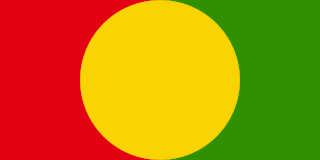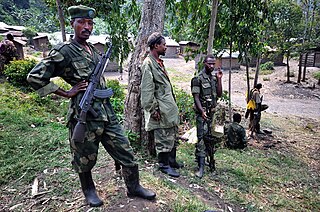Related Research Articles
The earliest known human settlements in what is now the Democratic Republic of the Congo have been dated back to the Middle Stone Age, approximately 90,000 years ago. The first real states, such as the Kongo, the Lunda, the Luba and Kuba, appeared south of the equatorial forest on the savannah from the 14th century onwards.

The Second Congo War, also known as Africa's World War or the Great War of Africa or the Great African War, began in the Democratic Republic of the Congo in August 1998, little more than a year after the First Congo War, and involved some of the same issues.

The United Nations Organization Stabilization Mission in the Democratic Republic of the Congo or MONUSCO, an acronym based on its French name Mission de l'Organisation des Nations Unies pour la stabilisation en République démocratique du Congo, is a United Nations peacekeeping force in the Democratic Republic of the Congo (DRC) which was established by the United Nations Security Council in resolutions 1279 (1999) and 1291 (2000) to monitor the peace process of the Second Congo War, though much of its focus subsequently turned to the Ituri conflict, the Kivu conflict and the Dongo conflict. The mission was known as the United Nations Mission in the Democratic Republic of Congo or MONUC, an acronym of its French name Mission de l'Organisation des Nations Unies en République démocratique du Congo, until 2010.

The Democratic Forces for the Liberation of Rwanda is an armed rebel group active in the eastern Democratic Republic of the Congo. As an ethnic Hutu group opposed to the ethnic Tutsi influence, the FDLR is one of the last factions of Rwandan rebels active in the Congo. It was founded through an amalgamation of other groups of Rwandan refugees in September 2000, including the former Army for the Liberation of Rwanda (ALiR), under the leadership of Paul Rwarakabije. It was active during the latter phases of the Second Congo War and the subsequent insurgencies in Kivu.

The Kivu conflict is an umbrella term for a series of protracted armed conflicts in the North Kivu and South Kivu provinces in the eastern Democratic Republic of the Congo which have occurred since the end of the Second Congo War. Including neighboring Ituri province, there are more than 120 different armed groups active in the eastern Democratic Republic of Congo. Currently, some of the most active rebel groups include the Allied Democratic Forces, the Cooperative for the Development of the Congo, the March 23 Movement, and many local Mai Mai militias. In addition to rebel groups and the governmental FARDC troops, a number of national and international organizations have intervened militarily in the conflict, including the United Nations force known as MONUSCO, and an East African Community regional force.

The Congolese Air Force is the air force branch of the Armed Forces of the Democratic Republic of the Congo (Congo-Kinshasa). From 1971 to 1997, it was known as the Zairian Air Force.
Bosco Ntaganda is a convicted war criminal and the former military chief of staff of the National Congress for the Defense of the People (CNDP), an armed militia group operating in the North Kivu province of the Democratic Republic of the Congo (DRC). He is a former member of the Rwandan Patriotic Army and allegedly a former Deputy Chief of the General Staff of the Patriotic Forces for the Liberation of Congo (FPLC), the military wing of the Union of Congolese Patriots.

The 2008 Nord-Kivu campaign was an armed conflict in the eastern Nord-Kivu province of the Democratic Republic of the Congo. The upsurge of violence in the Kivu conflict saw heavy battles between the Democratic Republic of Congo's army, supported by the United Nations, and Tutsi militia under General Laurent Nkunda.

The Democratic Republic of the Congo, and the east of the country in particular, has been described as the "Rape Capital of the World", and the prevalence and intensity of all forms of sexual violence has been described as the worst in the world. Human Rights Watch defines sexual violence as "an act of a sexual nature by force, or by threat of force or coercion", and rape as "a form of sexual violence during which the body of a person is invaded, resulting in penetration, however slight, of any part of the body of the victim, with a sexual organ, or of the anal or genital opening of the victim with any object or other part of the body."

The M23 rebellion was an armed conflict in North Kivu, Democratic Republic of the Congo (DRC), that occurred between the March 23 Movement and government forces between 4 April 2012 and 7 November 2013. It ended when a peace agreement was made among eleven African nations, and the M23 troops surrendered in Uganda. The rebellion was part of continued fighting in the region after the formal end of the Second Congo War in 2003. The conflict reignited in late 2021 after rebel "general" Sultani Makenga and 100 rebel fighters attacked the border town of Bunagana but failed. A few months later, with a much larger force, the rebels of the M23 movement renewed their attack and captured Bunagana.

The March 23 Movement, often abbreviated as M23 and also known as the Congolese Revolutionary Army, is a Congolese rebel military group that is for the most part formed of ethnic Tutsi. Based in eastern areas of the Democratic Republic of the Congo (DRC), it operates mainly in the province of North Kivu. The M23 rebellion of 2012 to 2013 against the DRC government led to the displacement of large numbers of people. On 20 November 2012, M23 took control of Goma, a provincial capital with a population of a million people, but it was requested to evacuate it by the International Conference on the Great Lakes Region because the DRC government had finally agreed to negotiate. In late 2012, Congolese troops, along with UN troops, retook control of Goma, and M23 announced a ceasefire and said that it wanted to resume peace talks.

Colonel Sultani Makenga is the military chief of the March 23 Movement, a rebel military group based in eastern areas of the Democratic Republic of the Congo. Makenga is an ethnic Tutsi and was raised in South Kivu. He fought for the Rwandan Patriotic Front during the Rwandan Civil War.

The United Nations Force Intervention Brigade (FIB) is a military formation which constitutes part of the United Nations Organization Stabilization Mission in the Democratic Republic of the Congo (MONUSCO). It was authorized by the United Nations Security Council on 28 March 2013 through Resolution 2098. Although it is not the first instance in which the use of force was authorized by the UN, the Force Intervention Brigade is the first UN peacekeeping operation specifically tasked to carry out targeted offensive operations to "neutralize and disarm" groups considered a threat to state authority and civilian security. In this case, the main target was the M23 militia group, as well as other Congolese and foreign rebel groups. While such operations do not require the support of the Armed Forces of the Democratic Republic of the Congo (FARDC), the Force Intervention Brigade often acts in unison with the FARDC to disarm rebel groups.
The 2013 Kivu offensive refers to actions in the eastern Democratic Republic of Congo by the Congolese army, which captured two towns from M23 rebels: Kiwanja and Buhumba, both of which are in the Rutshuru area of North Kivu province, near the Rwandan border.
The following lists events that happened during 1998 in the Democratic Republic of the Congo.

CODECO is a loose association of various Lendu militia groups operating within the Democratic Republic of the Congo. The name is an abbreviation of the group's lesser-known full name, the Cooperative for Development of the Congo, sometimes also styled the Congo Economic Development Cooperative.

In late March 2022, the March 23 Movement (M23) launched an offensive in North Kivu, clashing with the Armed Forces of the Democratic Republic of the Congo (FARDC) and MONUSCO. The fighting displaced hundreds of thousands of civilians and caused renewed tensions between the Democratic Republic of the Congo and Rwanda, as the latter was proved of supporting the rebel offensive.

In 2022, heavy tensions broke out between the Democratic Republic of the Congo (DRC) and Rwanda, which have led to several alleged attacks by Congolese and Rwandan forces on each other's territory. Rwandan forces have been caught crossing into the DRC multiple times, usually fighting alongside Congolese rebels.
Yusufu Eric Mboneza, more commonly called Yusuf Mboneza, is or was a Congolese military officer and rebel. During his career he served in the Rally for Congolese Democracy, the National Congress for the Defence of the People, the Armed Forces of the Democratic Republic of the Congo, and finally the March 23 Movement.

Kitchanga, also known as Kitshanga, is a town and a camp for Congolese Internally Displaced People (IDPs) in the Rutshuru Territory of North Kivu Province in the eastern region of the Democratic Republic of the Congo (DRC). Kitchanga is located 119 kilometers north of Goma and 10 kilometers north of Burungu. It also lies near Kizimba and Budey villages.
References
- ↑ Kibangula, Trésor (8 March 2013). "RDC – Bertrand Bisimwa, chef politique du M23 : " Nous attendons un projet d'accord de Kinshasa "" [DRC – Bertrand Bisimwa, political leader of the M23: “We are waiting for a draft agreement from Kinshasa”] (in French). Jeune Afrique. Retrieved 23 November 2023.
- ↑ "Bertrand Bisimwa, the man leading M23". dailymaverick. 16 April 2013. Retrieved 7 September 2013.
- ↑ "DR Congo conflict: M23's Bisimwa reject UN force". bbcnews.com. 1 April 2013. Retrieved 7 September 2013.
- ↑ "DR Congo conflict: M23's Bisimwa reject UN force". BBC News. 2013-04-01. Retrieved 2021-01-06.
- 1 2 Smith, David. "Congolese M23 rebels surrender". The Irish Times. Retrieved 2021-01-06.
- ↑ "DR Congo rebels 'wanted ceasefire'". BBC News. Retrieved 2021-01-06.
- 1 2 Lansford, Tom (2019). Political Handbook of the World 2018-2019, Volume 1. Los Angeles: CQ Press. p. 2019. ISBN 978-1-5443-2712-9.